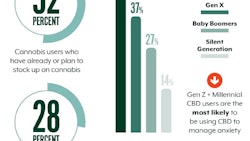
Cannabis businesses are no strangers to change—from frequent shifts in state programs and oversight, to the uncertainty of banking access and federal law. While cannabis businesses have seen themselves as vital from the beginning, navigating what it means to be “deemed essential” during the coronavirus crisis has brought new challenges by the hour.
In Illinois, for instance, the state’s strict sanitation guidelines now require medical dispensaries to disinfect all consumer-touching surfaces every 30 minutes, according to the Illinois Department of Public Health.
“In a 10-hour shift, that’s 20 times sanitizing the entire place: ATMs, countertops, bathrooms, et cetera,” says Charlie Bachtell, CEO and co-founder of Cresco Labs, a vertically integrated, multi-state operator. In an effort to help while “not getting in the way of a finely tuned machine,” Bachtell says he designated himself “the cleaning guy” and quickly got the process down to a consistent 12 minutes of cleaning, 18 minutes off-cleaning.
Retailers have looked to federal and state guidance on best practices to keep everyone healthy while still providing access to patients and consumers. Dispensaries also are adding their own protocols in addition to state requirements to keep people safe. But running an essential business smoothly and safely during a pandemic takes more than regular wipe downs. Here are a few other ways retailers can help see their businesses through this pandemic.
Overcommunicate
“If there’s one thing that something like this will remind everyone of is that communication is usually the foundation of success or failure. … Overcommunicating is the objective,” Bachtell says. “That rings true for your employees, for your customers, for your regulators, your investors, your partners.”
Enlist Technology
Curaleaf has been able to virtually eliminate wait rooms and lines by using Waitlist Me, a restaurant management app with call and text features to keep customers up-to-date and in queue from the comfort of their cars or homes. “To be able to control patient flow has been critical,” says Chris Melillo, senior vice president of retail at Curaleaf. “It gives us autonomy to ebb and flow the busiest parts of the day.”
Work with State Regulators
Melillo and Bachtell point out the need to stay in constant contact with state regulators to find fast solutions for increasing safety and efficiency with services like curbside pickup, delivery and credit card payment options. “It’s not us vs. them. It’s us together serving patients,” Melillo says. “I think the most important thing is showing states where you can have an opportunity to make an easy enhancement to the patient experience and overall business.”
Get Creative
This is particularly imperative for smaller operations where resources like access to a surplus of sanitation supplies can be difficult to come by, explains Chrissy Hadar, co-founder, president of retail and chief branding officer of Oregrown. “We’re having to get creative. Luckily, that’s one of our strengths, and we are resourceful without a doubt,” Hadar says. “We use things like isopropyl alcohol or hydrogen peroxide to sterilize pens and other office products to ensure the safety of our staff and our customers.”
Take Care of the Team
“The only way to keep people employed is by remaining open,” Hadar says. But, inevitably, staff may get sick or feel uncomfortable interacting with customers. Paid sick leave lets team members know they are supported because, Bachtell says, “there is no wrong way for somebody to react to a global pandemic.” Cresco added a policy for employees who don’t feel comfortable coming in. “That’s not lip service,” he says. Because, in the end, Hadar adds, “we’re all in this together.”























